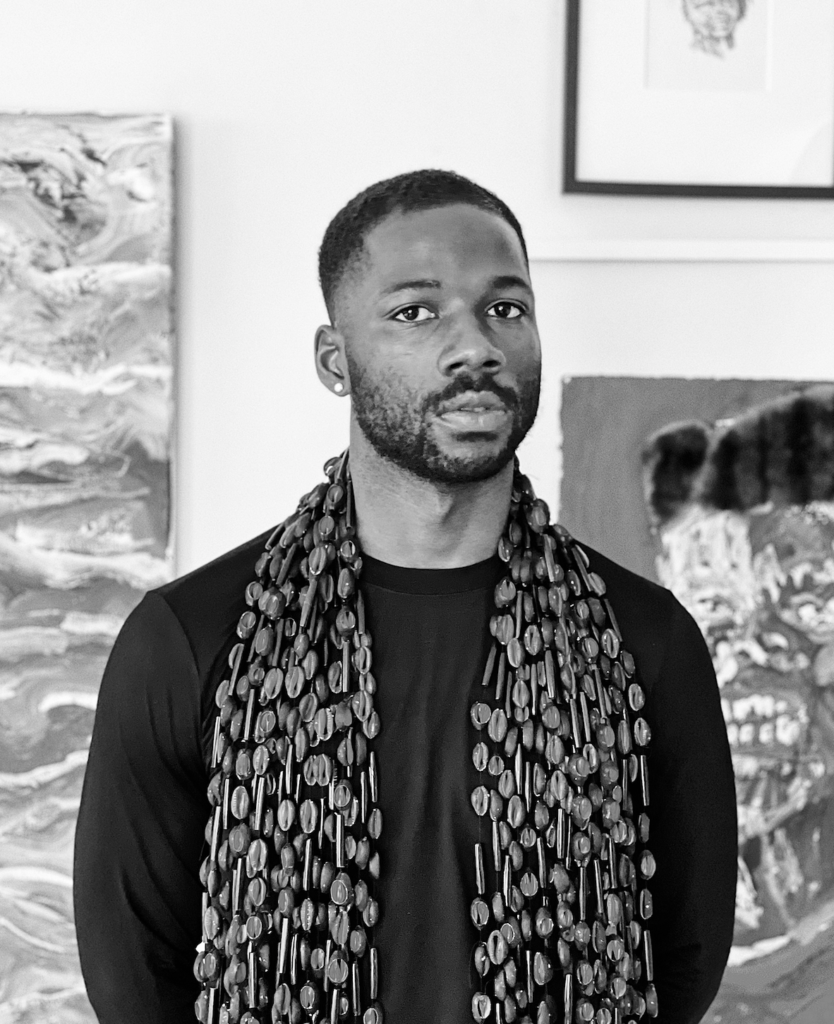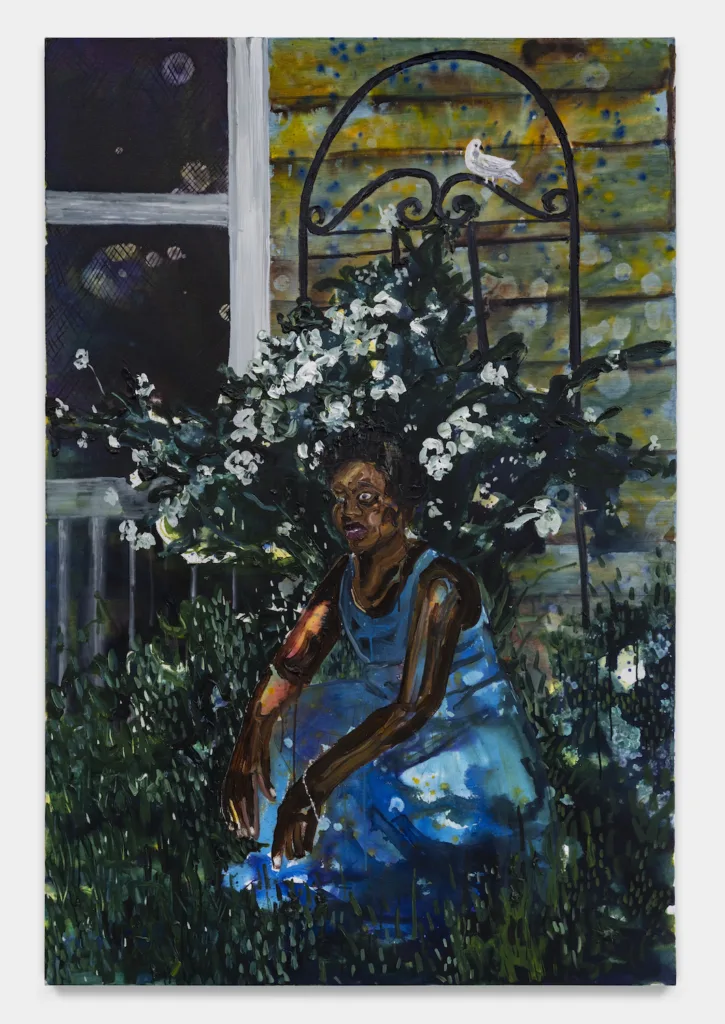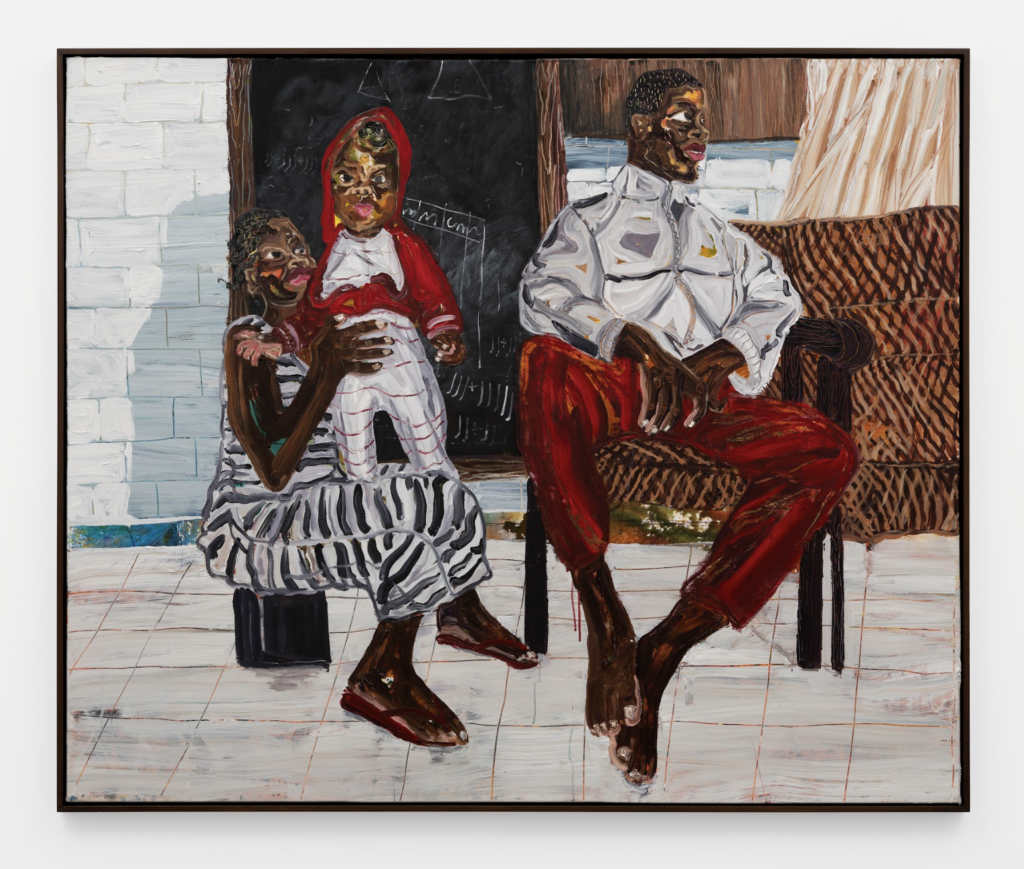The New York-based artist, who was born in Cameroon, draws inspiration from his own life as a Black immigrant to the country. He immigrated in the US when he was thirteen years old. This relocation has an impact on his art and throws light on issues of identity and the sense of displacement that comes from growing up as “a stranger in a strange land.” His paintings offer a complex yet very particular review of his family history, an intimate picture of Africa. Cultures before and after colocalization, customs, and ideologies of Africa and its diaspora. Nkoth earned his MFA degree from Hunter College in New York.
A.S: What made you want to become an artist, and how has your Cameroonian heritage influenced your work?
L.N: When I was a child in Cameroon art was always a kind of escape or an outlet—a place where I can create my own worlds. I realized I had an ability with art and I nurtured that skill from a very young age. I was one of those kids that could draw exact replicas of mangas or really anything in front of me. In general I was a really curious kid. I would break things apart, examine how they work and try to put them back together. I was doing this kind of thing so often that my grandfather actually thought I would become an engineer. In many ways I still break things apart in order to rebuild them. Art allows me to dissect the world around me.

A.S: What difficulties have you encountered as an artist, and how did you resolve them?
L.N: Doing my MFA in NYC was actually the first time I was in a dedicated art program. Before that I didn’t have a formal art education. I went to a public college in Spartanburg, South Carolina. I wasn’t brought up with histories and theories of art, so I felt like I was always trying to catch up. One of my biggest goals while in school was to try to overcome this. I dug my head in materials, books. That childlike curiosity I mentioned earlier really helped me out. I wasn’t shy about asking questions. I started asking people what books to read, what artists to look at. I learned so much about art by really putting myself out there in the city, by participating in different avenues of culture (like lectures, live music, artist talks) outside of the classroom.
A.S: What effects has your move to America had on your artistic and creative process?
L.N: All the effects! (laughs) Well, it was in America where I realised that I could make a career out of art. When I moved here at the age of 13 I knew nothing about the country. I was so young and I didn’t know what my skills actually amounted to. I rediscovered myself in America. I had to rediscover myself now as African American, too. I was able to find my voice through the process of reinvention and rediscovery.

A.S: What is your creative process like, from initial conception to finished product?
L.N: It starts with an idea and then I like ideas to be backed up, so I do research. I allow myself to explore while simultaneously thinking of compositions that respond to that initial idea. After engaging with research I start initial sketches. No matter what kind of work I end up making, whether it be something sculptural or a painting, it always starts with sketches. You can’t really put a studio process into words so easily—you have to see it. It’s such a physical process too, not only through the act of making something but also through the embodiment of the materials I use.
A.S: What topics are you interested in exploring in your work, and why?
L.N: To some, there’s a seemingly stark juxtaposition between where I came from and where I landed; but the themes of my work transcend geography. I’m interested in diasporic depictions of “home:” home as a concept, a place, the home that lives in people and objects we hold dear. I often find myself deconstructing a concept intrinsic to my personal story—migration, blended family, colonization, the spiritual realm.

A.S: What changes have you noticed in the Cameroonian art scene over time?
L.N: In West Africa there’s a lot of movement happening recently and I think that it’s slowly making its way in Cameroon. The land has always encouraged creativity but now people are finally getting noticed. The attention has shifted—more artists in the region are getting recognition.

A.S: How does your cultural background affect the way you create art?
L.N: My background inherently informs everything I do. My job as an artist is to use art to try to make sense of the world, and worlds that live within us. I’m interested in conversations concerning African American livelihood and how it has evolved throughout history. The concept of power—and ways to regain power back to my people—are omnipresent in my work.
A.S: Can you discuss a particular piece of collection you have created that has a special meaning for you?
L.N: The pieces I produced for my solo show, You Sea Us at Luce Gallery , was a very special body of work. The work was an aesthetic investigation of the human body in water, particularly the bodies of migrants. The issue I was tackling felt urgent—it represented conflict and the intimacy of justice.

A.S: How do you hope that people will be impacted and/or influenced by your work?
L.N: You know, I usually don’t try to determine how people might relate to my work but I do hope that my work acts like a mirror of our time and of our society. I can only hope that my work sparks up dialogue or curiosity.
AS: What words of wisdom would you impart to aspiring artists both in America and Cameroon?
L.N: It’s very cheesy and corny but I truly believe there’s wisdom in believing in yourself. But in order to do so, you have to do the hard work that’s required. It sounds simple but being focused and determined can be incredibly difficult at times. Believing in yourself can feel hard. You have to really love what you do.


